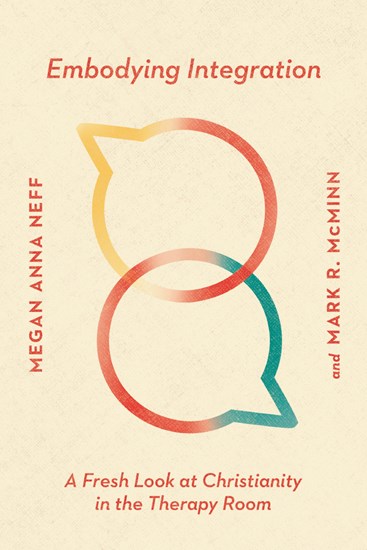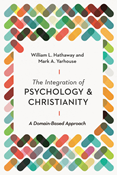
|
Embodying Integration
ebook
|
- Length: 272 pages
- Dimensions: 0 × 0 in
- Published: March 31, 2020
- Imprint: IVP Academic
- Item Code: 3188
- ISBN: 9780830831883
-
Other Retailers:
Amazon*
*affiliate partner
-
paperback
Discussing spirituality and religion in the therapy room is increasingly accepted, some even forgetting that integration of psychology and Christianity was once a rare thing. Yet even as the decades-long integration movement has been so effective, the counselor's lived context in which integration happens grows increasingly complex, and the movement has reached a new turning point. Christian practitioners need a fresh look at integration in a postmodern world.
In Embodying Integration, Megan Anna Neff and Mark McMinn provide an essential guide to becoming integrators today. Representing two generations of counselor education and practice, they model how to engage hard questions and consider how different theological views, gendered perspectives, and cultures integrate with psychology and counseling. "Many students," they write, "don't want models and views that tend to simplify complexity into categories. They are looking for conversation that helps them dive into the complexity, to ponder the nuances and messiness of integration." More than focusing on resolving issues, Neff and McMinn help situate wisdom through personally engaging, diverse views and narratives.
Arising from conversations between an up-and-coming practitioner and her veteran integrator father, this book considers practical implications for the day-to-day realities of counseling and psychotherapy. Personal stories, dialogues between the coauthors, and discussion questions throughout help students, teachers, mental health professionals, and anyone interested in psychology and faith to enter—and continue—the conversation.
Christian Association for Psychological Studies (CAPS) Books explore how Christianity relates to mental health and behavioral sciences including psychology, counseling, social work, and marriage and family therapy in order to equip Christian clinicians to support the well-being of their clients.
"In Embodying Integration, Neff and McMinn wonderfully accomplish the goal stated in their subtitle—A Fresh Look at Christianity in the Therapy Room. Their transparent and conversational writing style is enlivening and consistent with their stated values, yet their perspectives remain richly informed by psychological research, theological reflection, and clinical wisdom. The opening chapter on lament is worth the price of the book and takes us deep into their personal commitments to integrating spirituality, honesty, and compassion. At a time when many of us are weary of overly cognitive or idealistic discussions of 'integration,' this book can help us sense the rhythms of a more relational and fully embodied approach to both clinical practice and our lived theologies and psychologies."
"I expected a great book from Neff and McMinn, but I didn't expect to be so moved, and challenged, and changed. This book wrestles with the ultimate questions of living, not just for my patients or students but for me. The authors share personal stories and experiences that literally put flesh on a totally new way of integrating faith and psychology. God is doing something new here."
"Embodying Integration is, bar none, the most exciting innovation in integration since the pioneer days, fifty years ago. Instead of creating tightly reasoned relationships between psychology and theology, Megan Anna Neff and Mark R. McMinn have an extended daughter-father conversation. And that conversation transforms integration into a living, embodied, conversational quest for wisdom and connection—between psychotherapists and patients, among professionals, and between ourselves and God. This book will be the new standard textbook for integration courses."
"Neff and McMinn offer a creative look at teaching the integration of psychology and Christian faith in a postmodern world. They begin with issues in theology and then explore their import for the practice of therapy. This approach will engage younger clinicians who often want to know why integration is important before learning how to practice it. Embodying Integration is both theological and psychotherapeutically sophisticated. It is practically helpful to therapists-in-training as well as the professors who teach them."
"The world of the integration of Christianity and psychology is ripe for a shift. Although they have served an important function in their time, classical texts on integration were largely predicated on models that were both theoretical and abstract. Furthermore, these models were assumed to transcend context, being equally applicable to individuals of varying dimensions of identity. Indeed, while our faith identity represents the starting point and central facet of who we are, it does not negate the many other facets that also reflect God's handiwork in creating us as uniquely—us. This is perhaps most evident when I teach integration in other parts of the world. I am realizing more and more that what I have learned about integration is not integration par excellence but rather Western psychology and Western theology, integrated in a Western way. And while this is still helpful, it does not represent all there is to say about integration. A new conversation needs to be started that offers a fresh look on the topic, taking local context seriously. Embodying Integration, written out of a posture of humility and life that has been lived, represents such a text, and I am happy to offer it my wholehearted endorsement."
"In this collaborative effort, Megan Anna Neff and Mark McMinn employ postmodernism as a vehicle through which to challenge some of the defining characteristics of the decades-old 'integration' movement, dually encouraging Christian practitioners to evolve and advocating for new possibilities for Christian clients in psychotherapy. At times prioritizing future above past, dynamic above static, process above content, mystery above certainty, concrete above abstract, being above doing, questioning above answering, journeying above arriving, and accepting above changing, the authors have shifted the conversation to highlight some of the often-overlooked psychological and spiritual needs of Christians in the twenty-first-century therapy room. In doing so, they are attempting to dialogue directly and authentically with our rapidly changing postmodern culture by grappling with the role that Christianity will play in compassionately responding to a suffering world. An important read!"
"Megan Anna Neff and Mark McMinn have opened up new possibilities for how we talk about integration and live it out in the twenty-first century. Their wonderfully written book has profound implications for psychologists and counselors as they sit with themselves and their patients. It is accessible, honest, wise, and heartfelt. I was drawn in and delighted by this conversation. You will be too."
"As Megan Anna and Mark state, this is a 'novel and somewhat messy approach to integration'—one that I thoroughly enjoyed reading and welcome to my classroom. I have long been a fan of Mark McMinn's writings and use them frequently in my teaching and writing. He taught me the field of integration from afar, for which I am grateful. In this volume, however, they go a step further. I've known for quite some time that we need to have deeper conversations about integration as it emerges in the counseling office. I've felt this from my students and have tried to accommodate. Mark and Megan Anna did not give the formula, but they modeled how it can be done with biblical and theological wisdom, psychological refinement, and academic depth. Thank you for taking us a big step further along in the integration journey."
"Embodying Integration is a fresh take on the contested concept of integration. This father and daughter team invite us into their dialogue, discussing and modeling a conversational approach to bringing together psychology and Christianity. Rather than building models or systems, the authors propose integration as a verb, encompassing both a set of skills and, ultimately, a way of being. At the same time, the book is deeply theological, challenging readers to expand their horizons by interacting with the historic diversity of the Christian tradition. A crucial thread throughout is the encouragement to embrace uncertainty and tension, moving from a model of faith that is primarily about certainty to one based on trust in a God who is with us. Megan Anna and Mark invite us into the creativity of tension, doing their best to make it rich and life giving rather than threatening. This book fills a gap in the clinical integration literature, supplementing integrative works that are primarily content based and meeting therapists in the messiness of their work with patients. Whether or not you agree with every point in the book, engaging with their discussion will help you unclench your fists from the need for control and closure and move into a closer reliance on God's life-giving presence in ways that will benefit your clinical work and your life."
CONTENTS
Gratitudes
Introduction: Reflections on Contemporary Integration
Part 1: Facing Difficulty
1. Lament: How do we make sense of the deep aches in life?
2. Uncertainty, Meaning, and Enjoyment: Does anything make sense when the world is such a mess?
Final Conversation: Facing Difficulty
Part 2: Pondering God
3. Imaging God: What does my view of God have to do with my work as a counselor or psychotherapist?
4. Considering Atonement: From what are we being saved?
Final Conversation: Pondering God
Part 3: God in the World
5. Mission of God: What is God up to in the world?
6. God with Us: Where is God amid the deep uncertainties of life?
Final Conversation: God in the World
Epilogue
References
Name and Subject Index














